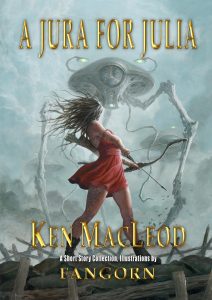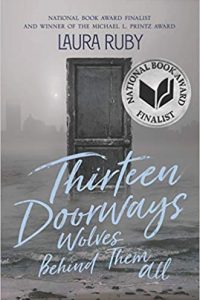A Jura for Julia by Ken MacLeod: Review by Niall Harrison
 A Jura for Julia, Ken MacLeod (NewCon Press 978-1-91495-383-5, 220pp, £26.99, hc) August 2024. Cover by Fangorn.
A Jura for Julia, Ken MacLeod (NewCon Press 978-1-91495-383-5, 220pp, £26.99, hc) August 2024. Cover by Fangorn.
I don’t think it’s entirely unrecognised that one of the most notable qualities of Ken MacLeod’s fiction is its dry humour, but I’m not sure it’s much discussed. So here’s a moment from “The Shadow Ministers”, one of a baker’s dozen of enjoyable stories collected in A Jura for Julia, that made me laugh. In a politically unstable near future, as a tool to increase social cohesion, the Scottish government has instituted a programme of Civic and Democratic Engagement education, as part of which children are asked to role-play as ministers and come up with their own policy solutions. But after a few years, it hasn’t quite worked out as hoped:
It backfired, but Education think that’s because something isn’t quite getting They’re still doing it, wondering why every year the kids come up with more and more outrageous ideas…. the whole thing of pushing teenagers to think in terms of practical policies does exactly that. Like the defence policy you came up with. Or Morag’s information policy: the way the problem is posed, any answer has to be revolutionary. This keeps happening.
It may not do much for you in isolation. For me, perhaps precisely because the rest of the story is not comedic and MacLeod has played straight the story of one particular group of teenagers and the policies they come up with, it landed. Jokes are partly about sudden shifts in perspective, and the +combination of extrapolative logic (of course they’re not the only ones), the implied backstory (evoking an entirely hapless governing class) and an expansive possible outcome (revolution!) gives that final brief sentence the force of a punchline. More than that, for me it works because reader and author are in on the joke together. This sort of thing does, indeed, keep happening in Ken MacLeod stories.
And, albeit perhaps not always with such understatement, so it does in SF more broadly, which MacLeod also knows, and nudges his readers about more than do most other current writers, such that the other thing that is apt to make me smile when reading his fiction is a seemingly offhand reference that acknowledges SF’s megatext. As with any cultural embedding, such references represent an authorial decision about their expected audience, and particularly so here, where they are usually doing double duty and contributing to the interpretation of the story. “The Shadow Ministers”, for instance, ends with a line that a great many readers will recognise as a nod to Neuromancer – “The sky above Port Glasgow was the colour of a hotplate, turned to a high level” – but which I also take as confirmation that the role of AI in the story is not as tangential as it may have appeared, and is probably in fact the real story. The narrative efficiency of such moments is a reminder that SF’s time as a genre – as a conversation – isn’t quite over yet.
You can see conversation within MacLeod’s own work, as well. The line between human and artificial intelligence has been a recurring fascination since his earliest novels, and the broadly chronological arrangement of stories in A Jura for Julia sees a range of positions tested. In “Lighting Out”, from 2007, Constance Mukgatle takes business advice from an uploaded “partial” of her mother and ends up nearly triggering a Fast Burn to posthumanity, but the story is as interested in the ethics of the process as the fireworks of it. In “The Vorkuta Event”, from 2011, a brilliant dark club story yarn about a mid-twentieth-century encounter with an alien machine in the Russian tundra inspires thinking about evolutionary computing that may change our future. “The Last Word”, from 2017, is a more superficial story in which two programmers invent an algorithmic guru, but their creation strikingly anticipates current large language models: “It’s not even an AI,” one notes, “It’s a learning algorithm with a library.” And in the collection’s closing and one original story, “A Jura for Julia”, there is a role for actual large language models. I don’t mean to extrapolate any definitive conclusion from these datapoints, but they show a writer sensitive to both the reality of and the discourses around the ideas he explores. This applies to political positions as much as science-fictional ones: “The Surface of Last Scattering”, “[citation needed]”, and “The Excommunicates” can be read as a fascinating triptych about ideas relating to speech and censorship.
The stories that bookend the collection are well-chosen because they bring the various characteristics I’ve touched on together. “Nineteen Eighty-Nine” and “A Jura for Julia”, as the title of the former gives away, require some familiarity with both Orwell’s great novel and the circumstances of its writing to be fully appreciated. They are sequels. In 1989, Winston Smith is once again arrested by O’Brien, except this time O’Brien is recruiting Smith into a conspiracy to liberate Airstrip One from Big Brother, which succeeds; and a few decades later, Julia Hobbs journeys to the Scottish island of Jura, where Orwell wrote Nineteen Eighty-Four, in search of a copy of The Theory and Practice of Oligarchical Collectivism, only to encounter a twist that evokes the work of Philip K. Dick. These are MacLeod stories – they do not attempt Orwell’s voice – and might at first glance appear to be something of a game, filled as they are with invented details about the establishment and fall of IngSoc that rhyme with our world in the way that enjoyable alternate histories always do. (This is where the LLMs come in – it turns out that IngSoc used them to develop their propaganda – and elsewhere, it is revealed that Winston is a child of the Windrush generation.) There are also deadpan jokes of the kind that I discussed at the start of this review, including two telling last lines. But MacLeod is in fact undertaking a larger project: In returning history to the hermetic world of Orwell’s story, in transmuting one kind of science fiction to another, he interrogates the place of Nineteen Eighty-Four in our actual political reality. The revolution does, after all, keep happening in Ken MacLeod stories, and maybe one day outside them, too.
Interested in this title? Your purchase through the links below brings us a small amount of affiliate income and helps us keep doing all the reviews you love to read!
In Niall Harrison‘s spare time, he writes reviews and essays about sf. He is a former editor of Vector (2006-2010) and Strange Horizons (2010-2017), as well as a former Arthur C. Clarke Award judge and various other things.
This review and more like it in the September 2024 issue of Locus.
While you are here, please take a moment to support Locus with a one-time or recurring donation. We rely on reader donations to keep the magazine and site going, and would like to keep the site paywall free, but WE NEED YOUR FINANCIAL SUPPORT to continue quality coverage of the science fiction and fantasy field.
©Locus Magazine. Copyrighted material may not be republished without permission of LSFF.








